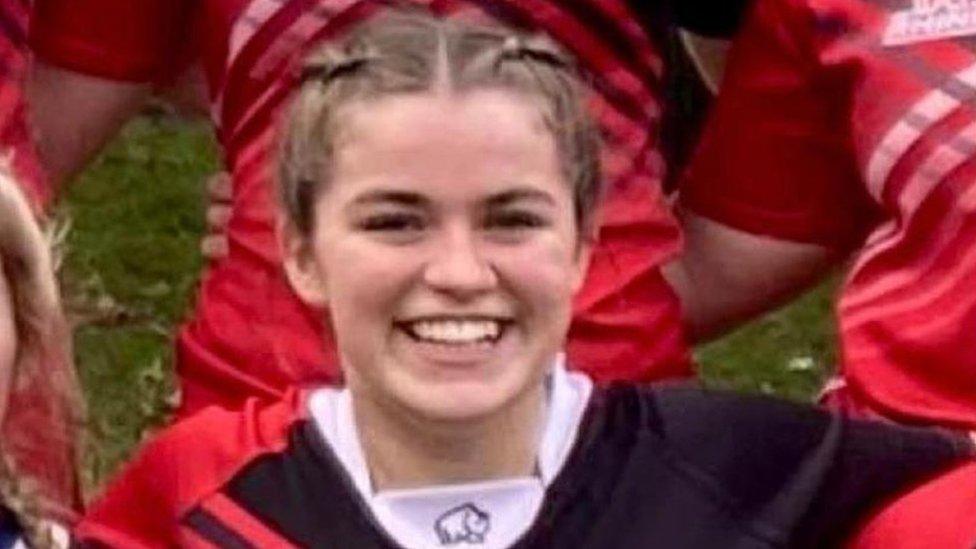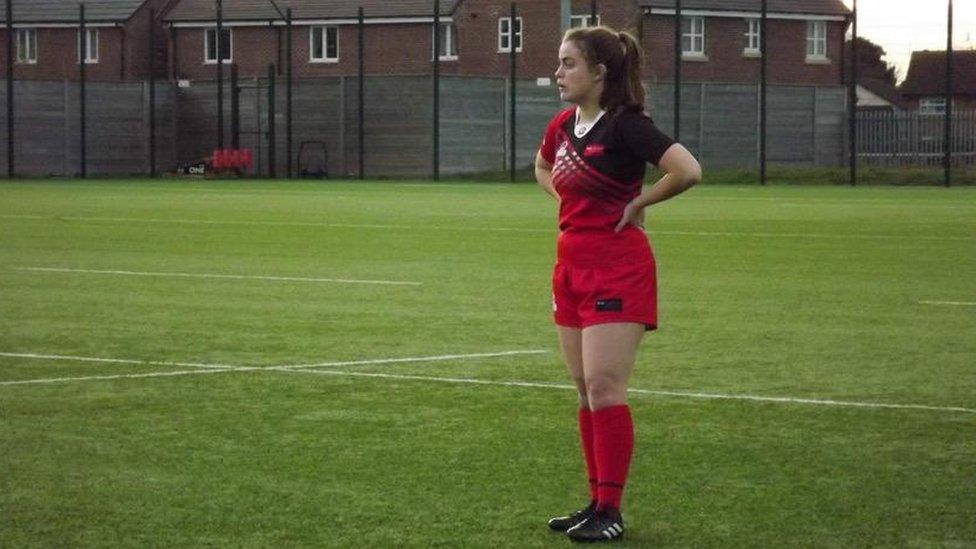Maddy Lawrence inquest: UWE student's scan delayed by bomb hoax
- Published

Maddy Lawrence was injured in a game on 9 March
An inquest into the death of a student rugby player has heard a bomb hoax led to delays in her receiving a hospital scan.
Maddy Lawrence, 20, had been admitted to Southmead Hospital in Bristol, after dislocating her hip in a rugby match on 9 March 2022.
She died two weeks later on 25 March with an infection in intensive care.
Ms Lawrence's doctors told the inquest about delays in getting blood test results after she was admitted.
The inquest heard there were hospital delays due to a bomb hoax.
'Appeared very unwell'
Dr Samuel Gove said he requested a CT scan on Ms Lawrence's hip and pelvis on 11 March, but the hoax incident earlier that day had caused disruption.
During this time, Ms Lawrence appeared agitated and in pain.
"I chased up the CT scan but was told it wasn't a priority due to the delays," he said.
Another witness, Dr Ellen Carter, said on 14 March: "Maddy was ashen and her eyes were rolling, she appeared to be very unwell.
"My level of concern increased and blood results showed very high potassium levels.
"I asked that ICU be called and Maddy was then admitted."
Blood sample delays
On the first day of the inquest, the coroner heard how Ms Lawrence waited more than five hours for an ambulance after she was injured.
Dr Thomas Edwards said on 13 March, he asked for fresh blood samples to check her kidney function but by the following day, they still had not been taken.
"So I printed off a sticker [to make it a priority] and asked for them to be done urgently," he said.
Noting that there were still no results in the hours afterwards, he was told the lab had not received any samples to process.

Ms Lawrence was playing in a University of the West of England rugby match when she was injured
He added: "I went to Maddy's ward to ask why and offered to take the blood samples myself.
"The registered nurse told me the healthcare assistant asked to do it had been unsuccessful at taking blood from Maddy [due to her veins] and, in a misunderstanding over her working an early shift, had then left the hospital [to go home].
"I was assured in no uncertain terms the tests would be done that day.
"I checked again later that evening - the blood results weren't available on the system."
In a written statement, Dr Zahid, who treated Ms Lawrence overnight from 11 to 14 March, said he had asked for the tests on 13 March before handing over to the day team.
"But despite repeatedly checking when I came back on shift [on 14 March] nothing had been received by the lab."
The inquest then examined the surgery Ms Lawrence went on to receive.
'Just couldn't cope'
Consultant plastic surgeon, Thomas Wright, said on 18 March he was informed she had a "life and limb" soft tissue infection, which required surgery.
"The intensive care team suspected sepsis and that she had a severe life-threatening soft tissue infection called necrotising fasciitis," he said.
When asked how necrotising fasciitis might have been contracted, he said: "It's seen more commonly in people with underlying health problems, or if they had a trauma which may have caused the infection."
After her first set of operations, he said she showed some initial improvement.
"I was hopeful we had controlled her infection and could move on from life saving treatment to reconstruction," he added.
But following more surgery, including amputation, Ms Lawrence's condition deteriorated.
When asked if he expected her to die, Mr Wright said: "We had good evidence the infection was under control.
"My assumption is she just couldn't cope with all the surgery she'd been through and the infection had gone too far."
After giving evidence, Mr Wright was told by the coroner the Lawrence family were very grateful to him for his efforts to help her.
The inquest continues.

Follow BBC West on Facebook, external, Twitter, external and Instagram, external. Send your story ideas to: bristol@bbc.co.uk, external
- Published29 August 2023
